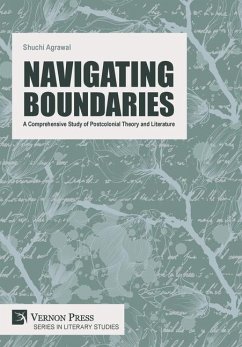
Navigating Boundaries
A Comprehensive Study of Postcolonial Theory and Literature
Versandkostenfrei!
Versandfertig in über 4 Wochen
69,99 €
inkl. MwSt.
Weitere Ausgaben:

PAYBACK Punkte
35 °P sammeln!
'Navigating Boundaries: A Comprehensive Study of Postcolonial Theory and Literature' delves into the intricate area of postcolonial discourse, amplifying the voices emerging from the margins, challenging dominant narratives while exploring the themes of identity, mimicry, hybridity, power and resistance. Drawing from key theorists such as Edward Said, Homi K. Bhabha, Frantz Fanon, Gayatri Chakravorty Spivak, Philip G. Altbach, Deepesh Chakravarthy, Chandra Talpade Mohanty, Gauri Viswanathan etc., this book offers a deep investigation into the multiple aspects of theoretical frameworks that sha...
'Navigating Boundaries: A Comprehensive Study of Postcolonial Theory and Literature' delves into the intricate area of postcolonial discourse, amplifying the voices emerging from the margins, challenging dominant narratives while exploring the themes of identity, mimicry, hybridity, power and resistance. Drawing from key theorists such as Edward Said, Homi K. Bhabha, Frantz Fanon, Gayatri Chakravorty Spivak, Philip G. Altbach, Deepesh Chakravarthy, Chandra Talpade Mohanty, Gauri Viswanathan etc., this book offers a deep investigation into the multiple aspects of theoretical frameworks that shape postcolonial discourse. The analysis moves seamlessly from theory to literature, investigating how postcolonial literary texts navigate critical issues such as hybridity, mimicry, identity and resistance. A vital resource for students, research scholars, teachers, and anyone curious about the dynamic field of postcolonial theory and literature, this book calls readers to reflect, question, and join the discourse on the complex narratives that continue to shape our world. Generally, most of the postcolonial critiques explore linguistic imperialism, but this book makes a groundbreaking contribution by foregrounding the use of vernacular languages in literary texts and critical theory, positing that this is not just an aesthetic choice but a form of resistance and identity reclamation. In doing so, it echoes Ngũgĩ wa Thiong'o's call for linguistic decolonization and applies it in a broader, more diverse context, examining how the act of writing in local languages disrupts colonial power dynamics and fosters cultural preservation. While much of postcolonial criticism tends to centre on broad historical and political analysis, 'Navigating Boundaries' emphasizes the multiple voices coming from Africa, Caribbean and South Asia, offering a more intimate look at identity formation in postcolonial settings. Moreover, the book's interdisciplinary approach strengthens its position in the field. By weaving in cultural studies, sociology, and psychological perspectives on gender, trauma, ethnicity and memory, it opens up fresh pathways, making the work relevant not just for literary scholars, but for those interested in a wider discourse on postcolonial theory.












